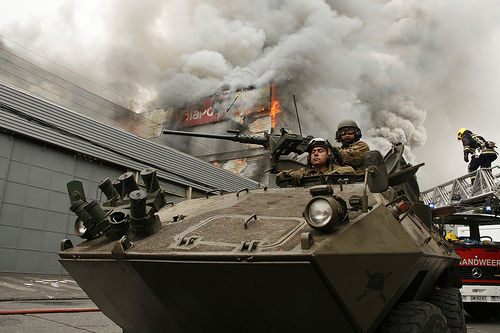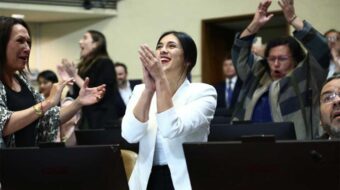
The following is an eyewitness account of Chile’s earthquake and the ensuing political struggle that took place immediately after the disaster.
VIÑA DEL MAR, Chile — On February 27, at 3:30 a.m., the life of millions would change forever. My family suddenly heard what sounded like one thousand huge garbage trucks rambling down our street. The scary noise was deep, deep, coming from the heart of the earth. All of the sudden, a mad King Kong grabbed our building and violently shock it, which felt like an eternity. At every shake a huge cracking noise went through the entire building and also through our spine.
In the south, the Pacific Ocean unleashed huge waves that covered resorts like Dichato, the port of Talcahuano, the city of Constitución, summer outdoor camps, fishermen ports, and small working class towns of miners and workers.
As a result, the middle southwest of Chile turned surreal, houses floating on the water, boats on top of trees, ships on the beaches, ship containers in the middle of the streets, cars and vehicles sinking in the ocean. Disoriented people, who just woke up in the dark, found themselves screaming in the middle of an horrifying and Dantesque nightmare.
The final tally may indicate the tsunami killed more people than the earthquake. Everyone was worried about tsunamis. But, the Chilean Navy announced there was no threat of tsunami. That was good news. People, who had run to the hills for protection from the dreaded giant wave, decided to come down to the coast line, just to find death in their own homes.
The Navy needs to explain its criminal ineptness. Not only that, but, the Navy´s report ignored a U.S. agency that monitors the Pacific for tsunamis. The agency alerted the Navy, only minutes after the quake, that a tsunami was on its way to the Chilean coastline.
It is intriguing this criminal ineptness, which will cost more lives than the quake itself, was less media-worthy than the looting of the Super Market Lider (Wal-Mart) in Concepción.
Jacqueline Van Rysselberghe, mayor of Concepción, a strong supporter of Pinochet and a contender in a future presidential election, blamed the Bachelet government for lack of food and water, the same morning the earthquake hit. (Talk about politics.) She also warned the government that people will get angrier and will start assaulting commercial establishments to get food and water.
Initial government assessments showed a national social situation under control. But, in a tense social atmosphere, anything can happen. Right after the mayor’s statement, a local radio show announced that women with their IDs could go to the “Super Market Lider” to get a “family basket” with food. When hundreds of people found the “Lider” closed, they reacted angrily and broke its metal doors and grabbed anything they could take. This incident was widely publicized and could have triggered the local pillage that followed.
These media reports gave the false image that nobody was in charge. That the Bachelet´s government was infective and invisible. That there was not law nor order.
However, it was these media reports that actually created the conditions for criminal activities. And, as the incoming right-wing president Sebastian Piñera called for the Armed Forces to take over, Mayor Van Rysselberghe also asked for the Armed Forces to take over the cities to prevent pillage.
The Piñera team, the press and the mayor of Concepción wanted the military to take credit for any success in coping with the emergency, and by doing so, discrediting the Bachelet administration. Their goal was to make a dent in Bachelet’s wide and deep prestige and popularity. Normally, the Army would be sent out to patrol and keep order. But under the terms of the National Emergency Office, civilian officials appointed by the government, “must follow military decisions,” and that is a sensitive matter in a country where the Armed Forces has a dark history.
Air Force chief General Ricardo Ortega said “He had planes ready to deliver aid just two hours after the quake but had to wait for Bachelet’s emergency declaration Sunday.” Bachelet replied that Ortega was “badly informed,” and she requested a helicopter to inspect damage right after the quake and got it six hours later. That was at a crucial moment, when the entire country was expecting the president to be visible and on top of the situation. Yet, nobody from the media asked the general the reasons why it took six hours to respond to the president’s request.
Despite all of this the Bachelet government went directly to the people. Bachelet was everywhere: informing dignitaries and world leaders, flying to little towns in the south, presiding over coordinating meetings, informing the incoming Piñera authorities, getting informed by her ministerial advisers and overseeing activities at the earthquake’s epicenter.
As a result, aid and basic services have been restored, as well as medical assistance and communications. Thousand of young professionals, university students and international crews of medical volunteers, sent by a number of countries, are heading south. These effective activities from the government and the solidarity coming from all over the world, give us a solid base for reconstructing a future.
The earthquake’s aftershocks were also a terrible and horrifying experience. Standing on the street I felt the ground shaking under my feet with such force that I had little control of my balance. That was the first big aftershock (réplica) and whose force was greater than Haiti’s earthquake. When the ground shakes, it is extremely disturbing. It was bad. Very bad.
But the shaking continues, and along comes anxiety. We are living with aftershocks, long and strong.
Earthquakes are acts of nature, but they are also political events. We will certainly see more of this kind of politics since Piñera and the entrepreneurship class took over the government March 11.
Nery Barrientos lives in Chile and is a veteran of numerous political struggles.












Comments